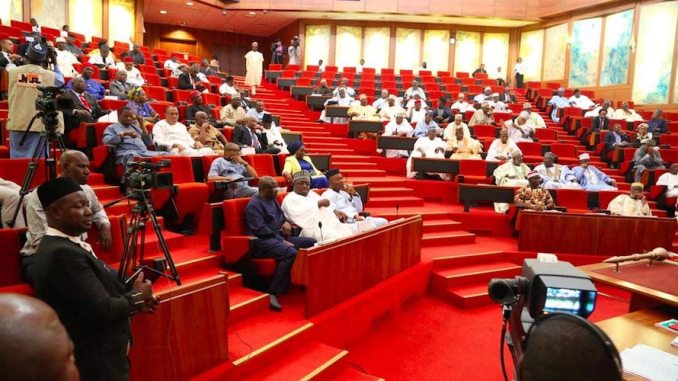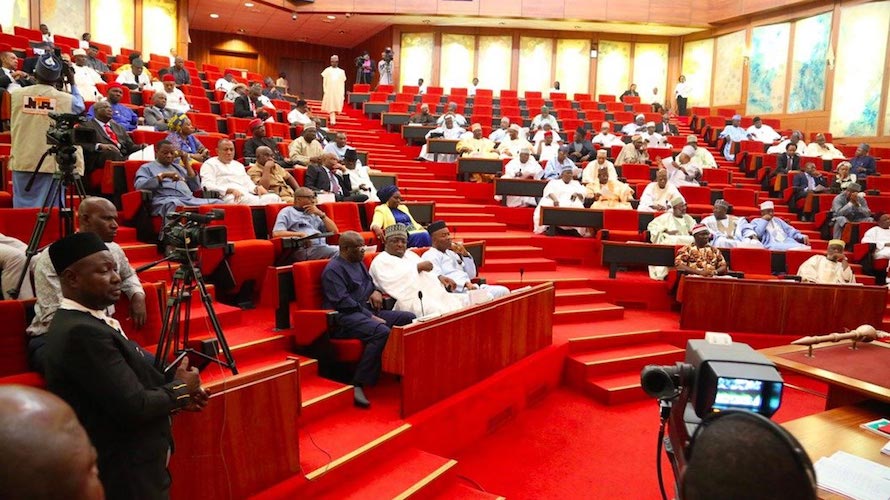
The N11.03 trillion deficit proposed for the N19.76 trillion 2023 Budget will be tackled by the National Assembly through required amendment of relevant provisions of the Finance Act.
Specifically, the Senate said the planned amendment will ensure the various revenue generating agencies double or triple their targets earlier given them, as a major step towards reducing the size of the proposed budget deficit.
The deficit
Defending the 2023-2025 Medium Term Expenditure Framework (MTEF) and Fiscal Strategy Paper (FSP) before the lawmakers, Minister of Finance and National Planning Zainab Ahmed had said the federal government would borrow over N11 trillion and sell national assets to finance the 2023 budget deficit.
She was also quoted as saying the government’s budget deficit is expected to exceed N12.42 trillion if it should keep petroleum subsidy for the entire 2023 fiscal cycle.
In explaining two scenarios of the budget deficit, she said the first option involves retaining the petroleum subsidy for the entire 2023 fiscal year.
In the first scenario, the deficit is projected to be N12.41 trillion in 2023, up from N7.35 trillion budgeted in 2022, a figure that represents 196 per cent of total revenue or 5.50 per cent of the estimated GDP.
Under this option, she added, the government would spend N6.72 trillion on subsidy.
On the second scenario, the minister said this had to do with keeping subsidy till June 2023.
With this setting, there will be a deficit of N11.30 trillion, representing 5.01 per cent of the estimated GDP.
And under this arrangement, PMS subsidy is projected to gulp N3.3 trillion.
Either way, the two scenarios have budget deficits far above the stipulated threshold in the Fiscal Responsibility Act.
And Senator Olamilekan Adeola (APC Lagos West), who chairs the Senate committee on finance, had told heads of revenue generating agencies at different times, to think out of the box in making more revenues for the country in the coming fiscal year to reduce the proposed deficit size and loan collections for budget financing.
Senate moves
But the Senate is of the view that the trend could be corrected via a Finace Act amendment.
Chairman Senate Committee on General Services Sani Musa (APC Niger East) said this Friday while speaking to journalists in Abuja.
Senator Musa who spoke at the frontage of temporary chamber being put in place for Senators in view of renovation work going at the main Chamber tacitly said, the Tuesday resumption will depend on how proper the temporary chamber is put in place.
He said: “The budget of this country has been in deficit and the only thing we can do is to amend so many things in the Finance Act, so that we can be able to generate more revenues from other sources rather than depending on oil alone and by extension , reduce the size of proposed budget deficit.
“By now, the temporary chambers should have been ready knowing that we are resuming. Initially, we are supposed to resume on the 20th of this month, but there are some little things that need to be done before then.
“But I can assure the general public that this will be done in the shortest time and we are going to resume to receive Mr. President and to present the 2023 Budget.”
“You will recall that the 9th Senate has done very well, because this edifice since it was built, has never been rehabilitated, we are refurbishing it, bringing it back to standard like any other parliament you see around the world.
“The FCT that is doing this job has been up and doing, but we need to push, they need to do more so that we will be able to resume as quick as possible.”
Commenting further on the general renovation work going on at the National Assembly, Senator Musa said it was a project long overdue and very necessary in making the National Assembly; particularly the Hallow Chambers meet up with global standard.
“It is a great achievement for us that we are renovating the National Assembly complex that has been built over 20 years.
“What we read from the newspapers that NASS leadership has not done anything on the leaking roof is not true. This edifice is supposed to be managed and taken care by the FCT, because it is their property, but now we have taken it as a responsibility on us to make sure we renovate it.
“I’m sure that by the time the renovation of the National Assembly chambers is completed, other African countries will come to see and make Nigeria as a case study and see how we have improved on parliamentary infrastructure,” he added.
NLC on subsidy
In a related development, the Nigeria Labour Congress (NLC) has insisted that her position regarding the controversial subsidies on petroleum products is that government must ensure public refineries were put back to work.
NLC President, Comrade Ayuba Wabba stated this while reacting to a report credited to Minister of State, Labour and Employment, Festus Keyamo on alleged support for removal of subsidy by the presidential candidate of Labour Party, Peter Obi.
But Wabba said Labour’s rejection of 100 per cent importation of PMS has not changed.
Wabba further said the organised labour had presented her charter of demands being used to engage political processes in the country.
“In the statement, APC challenged the Nigeria Labour Congress over its seemingly support for the position of the Labour Party Presidential Candidate, Mr. Peter Obi on the heated issue of the removal of petrol subsidies.
“First, we wish to commend the Honourable Minister of State for responding positively to earlier calls by the Nigeria Labour Congress that political parties must focus their engagement on the current electoral cycle campaigns on issues,” the NLC said.
The NLC president, who advocated for an issues-based campaign ahead of the forthcoming 2023 general elections, assured that such move would address the nation’s burning issues.
Wabba said: “We believe that an issue-based political campaign will help sieve the facts from fiction, address burning national issues, review the performance of those in government at all levels especially on the delivery of the Sustainable Development Goals, improve Nigeria’s public accountability frameworks, prepare voter behaviour on Election Day away from the destructive lines of ethno-religious divide and defuse the looming political tension in the country.
“Second, in furtherance of the avowed position of the Nigeria Labour Congress on issues-based political campaign in the run up to the 2023 general election, we wish to state that Nigerian workers through a number of painstaking processes have been able to articulate a Nigerian Workers’ Charter of Demands which the NLC and TUC are using to engage the political process.
“A major demand in the Nigerian Workers Charter of Demands is that our local public refineries must work. We have also demanded that we must stop 100% importation of refined petroleum products.
“The NLC and the Labour movement in Nigeria has over many decades been vehemently consistent that the only way to address the issue of the so-called petrol subsidies is to get our refineries to work. The logic is very simple: it is atrocious to buy from abroad at very costly prices a product that a country like ours can easily and affordably produce at home.
“At the heart of our demand on the management of Nigeria’s mineral resources especially our downstream petroleum subsector is the issue of Production Economy.
“We believe that the transformation of Nigeria from the current ruinous path of Consumption Economy to Production Economy is the only way to resolve Nigeria’s nightmares of massive depletion of scarce foreign exchange reserve; continuous devaluation of the Naira; significant jobs haemorrhage and destruction, deepening of poverty and downturn in the living standards of our people.
“In a determined effort to popularise the positions in the Nigerian Workers Charter of Demands, the NLC and TUC at the behest of the Labour Party on September 12 – 13, 2022 participated in a National Retreat of the leadership of our movement.
“At the retreat, the Labour Party and Organised Labour in Nigeria adopted and mainstreamed the Workers Charter of Demands in the Manifesto of Labour Party. This is in line with our persuasion that issue-based campaign anchored on the manifesto of political parties should drive Nigeria’s political process.
“If any political party goes around saying that they plan to sell our refineries, remove subsidies, and further oppress long-suffering Nigerians, they should be ready to defend such stance to Nigerians at the campaigns. The NLC, Organized Labour, and Labour Party’s position has not changed. It only got amplified.”
